Who Wants To Be a Millionaire's best bits
- Published
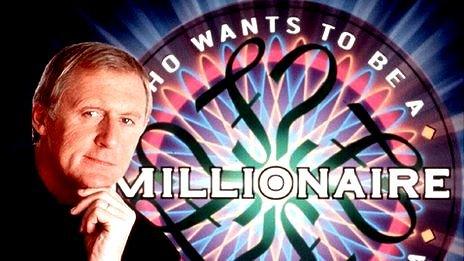
Host Chris Tarrant said giving away £1m is "one of the biggest buzzes"
After more than 15 years on UK screens, quiz show Who Wants To Be a Millionaire? is reaching its end.
A game of knowledge laced with tension and big money prizes, Millionaire has made a considerable impact since it launched in 1998.
Here is a glance at what the game show has given us during its years as a television talking point, with help of Chris Tarrant, who hosted the programme throughout its run.
He says: "I'm leaving the show with sadness, but I think it's run its course", adding that his days as a game show host are over.
Millionaires
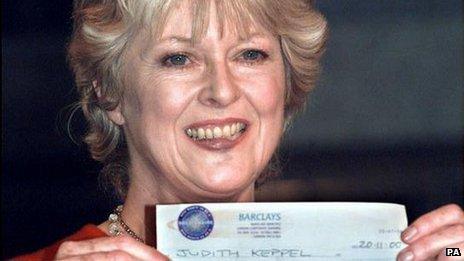
In the UK, only five contestants have kept their composure to answer 15 multiple choice questions correctly and walk off with the £1 million jackpot.
The first was Judith Keppel (pictured) in 2000, whose prize-winning answer was that Eleanor of Aquitaine was the consort of King Henry II.
The most recent millionaire was Ingram Wilcox back in 2006. Chris Tarrant says the introduction of charity specials made celebrities less likely to gamble to try and win the big prize, while "not very many of them are that bright".
As for regular contestants, he blames the economic downturn for the later drought of people taking home the top prize.
"I genuinely think people were saying, 'I can't risk it'. They would not gamble."
But the US was the first country to crown a winner on Who Wants To Be a Millionaire? in 1999.
John Carpenter was sure of his final answer and had all three lifelines intact. But he used one of them - phone a friend - simply so he could tell his father, external that he was about to scoop the jackpot.
Catchphrases
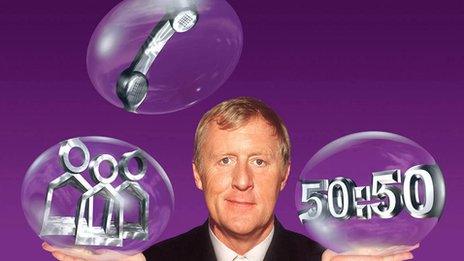
The game offered competitors three lifelines on their quiz journey, with "phone a friend" taking on a life of its own in the nation's consciousness and falling into everyday use.
Contestants could make a call to someone they considered knowledgeable and reliable, which required some organisation for producers.
"For the live shows, we'd have security men in people's houses telling them not to watch the TV. And for some we had them in a darkened room round the back of the studio," recalls Tarrant.
"We had one or two who we rang and were on voicemail!"
Another phrase which was essential to the programme was 'final answer?' Once that was 'locked in', there was no going back.
Tarrant adds: "I didn't have anything on my screen before the final answer. I often knew - I'm quite an intelligent man!"
Devil's advocates
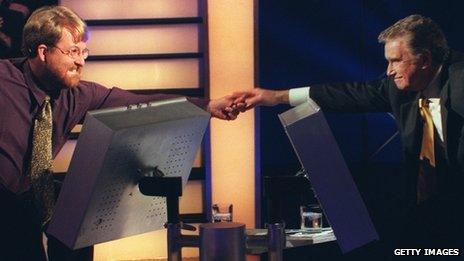
As the show's presenter, Chris Tarrant spent much of his time perched on a high chair with the contestants facing him over a pair of screens.
"It was almost the two of us in a little private world with everyone around us watching. I was the devil's advocate," he says.
"I may have teased them and made them sweat but I was their best friend and steered them to winning as much money as possible."
Tarrant was the blueprint for hosts in other countries, many of which developed their own styles, including Japan's "terrifying" Monta Mino, while Regis Philbin (pictured) presided over the US show.
"I saw it in Kazakhstan recently and thought 'this huge man with a moustache is actually me!'" adds Tarrant.
TV tension
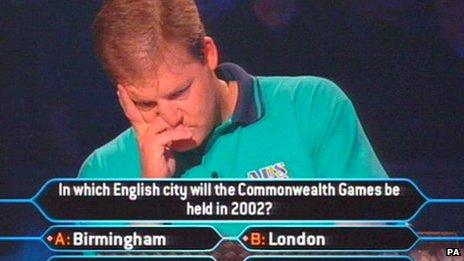
Attempting to win a million pounds is a serious business, and the show used an armoury of tools to keep contestants - and viewers - on the edge of their seats.
There was tension-building low level music and sound effects throughout proceedings.
The quiz became the home of the pregnant pause before results were revealed - which were sometimes saved for after a commercial break.
"Now everybody does it and you all know where it came from. It's just a bit over-used," says Tarrant.
And finally there was the dreaded klaxon, which signalled the sudden end of an edition, quite often at a critical moment.
Cough, splutter
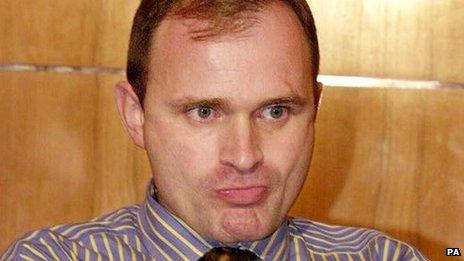
In 2001, Charles Ingram (pictured) answered his way to the top prize on Millionaire - the third UK contestant to achieve the feat.
But his winnings were suspended when it was discovered that he had been steered to success, external with the help of an accomplice in the audience who coughed to indicate the correct answers.
The plot nearly fell apart when Ingram came close to settling on an incorrect answer about singer Craig David. It was suggested that gasps from the audience made him change his mind.
Ingram, his wife Diana and accomplice Tecwen Whittock were tried and found guilty of deception and handed suspended prison sentences in 2003.
Global domination
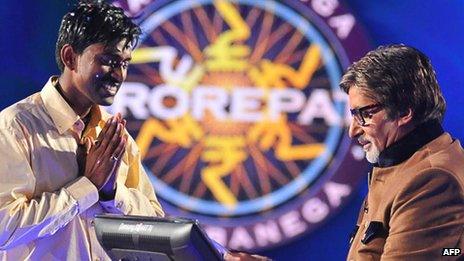
The format to Who Wants To Be a Millionaire? - which was devised in the UK - has been exported to around 100 countries worldwide, including Afghanistan,, external China and Uruguay.
In India (pictured), where the show continues to be a hit, it has been hosted by Bollywood film stars Amitabh Bachchan and Shahrukh Khan.
Chris Tarrant believes that the TV programme has become a number one ratings hit in almost every place it's landed.
He adds that his fame has even been recognised on the streets of Sierra Leone.
Hollywood glitz
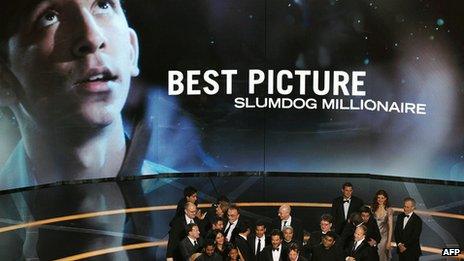
Who Wants To Be a Millionaire? formed the backbone of a movie about the story of a young man from the slums of Mumbai who stands to walk off with the biggest prize on India's version of the quiz.
Directed by Danny Boyle, this uplifting tale with a flash of Bollywood musical glamour became a box office smash.
But it got better and better as Slumdog Millionaire caught the eye of Hollywood and triumphed with eight Oscars at the Academy Awards ceremony in 2009.
Boyle was named best director, it picked up the best film award and a clutch of other gold statuettes.
Almost better than winning a million pounds on a quiz show...
The final edition of Who Wants To Be a Millionaire in the UK will be screened on ITV on 4 February at 2000 GMT.
- Published8 January 2013